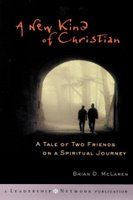 I have begun A New Kind of Christian by Brian McLaren. I really have enjoyed some of the insights that McLaren brings to the theological table. We have, in American Evangelical Christianity, read ideals into the Bible that are not there. As an example, many American Christians view democracy as the biblical standard of civil government. In the Middle-Ages the divine right of kings was seen as the biblical standard. We are called to examine these ideas in the light of the Word of God.
I have begun A New Kind of Christian by Brian McLaren. I really have enjoyed some of the insights that McLaren brings to the theological table. We have, in American Evangelical Christianity, read ideals into the Bible that are not there. As an example, many American Christians view democracy as the biblical standard of civil government. In the Middle-Ages the divine right of kings was seen as the biblical standard. We are called to examine these ideas in the light of the Word of God.Some of the ideas that I am not persuaded by include the idea that Modernity (and the Christianity that fits into it) found its fullness in 19th century rationalism. Most of the book thus far, argues that this is the fullness of Modern Christianity and we interpret our experiences and our understanding of Scripture from this vantage point.
I would argue that there was a decline in Christianity and its adherence to the Word of God after the end of the 17th century. Thus making Modernity itself a falling away from the biblical standard. We are called to a personal as well as a communal relationship with Christ. Modernity stresses the personal at the expense of the communal. Although much fruit for the sake of the Gospel has been produced after the 17th century- Christianity was at its height as a spiritual and cultural power prior to this time.
There are many things that I have enjoyed about the book but I think that McLaren is missing the mark. McLaren challenges Christians to take the leap from Modernity to Post-Modernity to aid in our understanding of culture and Scripture- but I would find the biblical challenge to be to jump out of Modernity and Post-Modernity into an eternal perspective from which to view the world, the Church, and the cultures around us.
2 comments:
Great point, Nate.
It seems that there is a tension that creates a balance between being made all things to all men that some be saved.
At the same time, there is a Biblical calling for the Church to influence the world, not the world to influence the Church, the Church's message, the Church's model, the Church's clothes, the Church's geneal behavior - that Christ be not offended.
1Cor 10:32-33 Give none offence, neither to the Jews, nor to the Gentiles, nor to the church of God: Even as I please all [men] in all [things], not seeking mine own profit, but the [profit] of many, that they may be saved.
The church needs to stick to the gospel as it is presented in scriptures. Didn't Paul critize Corinth for tryin to be culturally relevant? The results of this is sad. Inmature weak Christians who remain babes and unsaved persons with a false sense of assurance of their salvation. Why would the church want to adopt a philosphy such as post modernism that believes that there are no moral absolutes? Scripture teachs that God and his word are the final authority. I think the world will look at the church and think they are just like us why should I be a part of it?
Post a Comment